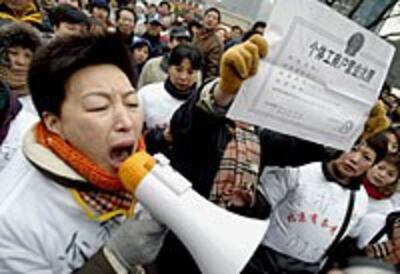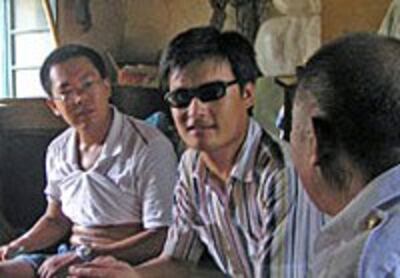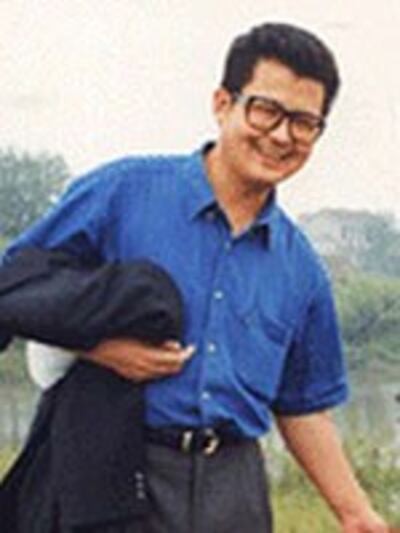
HONG KONG—China’s breakneck economic growth has created thousands of groups of disenfranchised people nationwide who are increasingly using the country’s legal system to defend their rights, experts say.
At a conservative estimate, tens of thousands of people are involved in some kind of protest against the Chinese authorities every year.
China’s Communist Party has warned members that it risks falling from power if corruption continues unchecked.
“It’s about these words: ‘rule of law,’” prominent rights lawyer Guo Feixiong told Radio Free Asia’s Mandarin service shortly before his detention by Guangzhou police. “But the space those words take up is being squeezed smaller and smaller.”
'Civil rights'
It is sparking mass incidents in the countryside. We absolutely cannot commit a historic error over land problems.
Lawyers and political analysts note a new awareness of civil rights among ordinary Chinese—epitomized by the failed attempt in July 2005 by villagers in Taishi, Guangdong province, to recall their elected village chief amid corruption allegations.
A new adjective is being applied to people and activities: weiquan, meaning simply "rights protection," although it is closer to the concept of civil rights than of universal values of human rights.
Rather than penning well-crafted essays on broad themes aimed at Party ideologues and the urban elite, the new breed of Chinese activist is more likely to use their pens on countless official forms and letters, culminating in complaints, lawsuits, or appeals to Party disciplinary systems.
As one emerging AIDS activist told RFA from the inside of a local police station, much of their work entails knowing when to cooperate and when to refuse.
“The police want me to write a document detailing the content of my complaint to the Ministry of Health in Beijing. I won’t write it, and they say they’re going to put me in jail if I don’t. I won’t write it,” said Li Xige, who campaigns for compensation for the death of her nine-year-old daughter.
Li, the baby she gave birth to, and several other women in her community were infected with the HIV virus through contaminated blood transfusions.
A force for change
“They are not letting me go,” she told reporter Shi Shan. “I’m not accepting this. This is a human life we are talking about, a life that has been lost. Those government officials are not taking responsibility,” she told.
We should get to work to build a country under the rule of law, so that children won’t have to suffer that way in future. It is wrong.
Petitioners, activists, and their lawyers all too often meet with stonewalling and even violent attacks from gangs of heavies hired by the government.
The government is so afraid that petitioners and protesters will make common cause with each other, especially in major cities, that local authorities routinely detain anyone heading for Beijing with a complaint.

Rights lawyer Guo, currently being held in a Guangzhou detention center for ‘illegal business activities,’ says China’s leaders now regard him and his ilk as public enemy No.1.
“Their attitude is already quite hysterical, because if they arrest us, then we might become martyrs in the cause of justice, but if they don’t lock us up, people might get to hear about us. So they are caught between a rock and a hard place,” he said.
Changes in Constitution
“The only thing they can do is to hire mafia thugs to do it for them. This means that there is nothing we can do in the normal run of events about these beatings and harassment,” Guo said.
“If we go to the police or to the courts we will get nowhere. There is no channel we can use to protect our rights. All we can do is blow the whistle on what they are doing.”
“I believe that the civil rights movement in China will become a force for social change, and that those responsible for these travesties of justice will be held responsible,” Guo said.
Even in highly publicized cases such as the bloody crackdown on peasant protesters in the southern Chinese city of Shanwei in December 2005 and the bid by the villagers of Taishi to remove their elected chief earlier that year, the authorities sentenced a group of protesters it describes as ringleaders to jail terms of up to five years for their part in the protest.
Behind the scenes, however, alarm bells are ringing for the Communist Party.
In a two-part feature story on the loss of rural land to development projects pushed forward by greedy and corrupt officials, the official Xinhua news agency quoted Premier Wen Jiabao as sending out a warning to the Party rank and file that “illegal” seizures of land in rural areas could lead to instability.
'Many people are concerned'
“It is sparking mass incidents in the countryside,” Wen was quoted as saying in the story dated Sept. 1. “We absolutely cannot commit a historic error over land problems.”
China’s parliament voted three years ago to enshrine human rights and the protection of private property into the country’s Constitution, and Beijing is a signatory to the two United Nations covenants on human rights, requiring a slew of amendments to lesser laws as well.
Many of China’s rights lawyers welcome this, hoping that if they argue on the basis of China’s written laws for long enough, the letter of the law will gradually acquire an accepted social meaning as well.
Like many other rights activists, Beijing-based lawyer Gao Zhisheng, detained since this interview in an unknown location after a family visit to Shandong, says he never set out to defend justice in his country.
“None of the things we are doing today is in the service of a great and noble cause, such as justice. We are trying to cling on to our dignity as human beings,” he said.

“We are forced into this solemn and tragic role in the eyes of the rest of the world and our own authorities, but all we want to prove is that we are human. Unfortunately our rulers don’t accept it.”
None of the things we are doing today is in the service of a great and noble cause, such as justice. We are trying to cling on to our dignity as human beings.
“Nothing in our civil rights work has surpassed these most basic qualities of peace, civilized behavior, and rationality that are part of the spirit of the modern age. Such things are naturally the enemy of the Chinese authoritarian regime, and so the clash between us is inevitable,” he added.
China’s army of petitioners, activists, and lawyers doesn’t march under a unifying ideological banner, nor do they unite around a leader or show interest in stating a political agenda.
So can China be said to have a civil rights movement? U.S.-based human rights campaigner Liu Qing thinks it can.
'Unbearable' for some
“If there weren’t a lot of people involved, then we wouldn’t be able to call it a movement...Also, in China, there are many people who are concerned with what’s going on, and there are reports in the media,” Liu said.
“There are also some people who risk life and livelihood to help those who have been oppressed. Among them are also many who have been persecuted themselves. We call it a movement for these reasons.”
While the struggles of Chinese activists seem inevitably to lead to beatings, detentions, and jail sentences, analysts say the problem is systemic, rather than ideological, and therefore isn’t going away any time soon.
“The reason you have so many people standing up for their rights nowadays is that I think the majority of people have realised just how corrupt the Chinese Communist Party system is,” Canada-based Chinese lawyer Guo Guoting said.
“The reality of the society they live in is becoming more and more unbearable.”
Ai Xiaoming, professor of Chinese literature at Zhongshan University in Guangzhou, agrees. Speaking after the detention of Gao Zhisheng, she told RFA of her reaction after she called the Gao family home for news.
“At the beginning of the Cultural Revolution (1966-76) my father was denounced as an ox ghost and snake spirit, and our family home was searched by Red Guards,” Ai said.
“I was a child of three at the time. When I heard Gao Zhisheng’s daughter crying I was overwhelmed with sadness because I remembered what had happened to me when I was a child.”
“We should get to work to build a country under the rule of law, so that children won’t have to suffer that way in the future. It is wrong.”
According to China's official new agency Xinhua, 40 million farmers have lost their land over the past decade due to urbanization, with another 15 million set to suffer a similar fate over the next five years, according to a report from China's Ministry of Labor and Social Security in July.
The total area of land seized illegally for development nationwide rose by 20 percent in the first five months of this year, according to the Ministry of Land and Resources.
Disputes over land have emerged alongside, the agency said. In January 2006, the Ministry of Public Security reported 87,000 protests, riots, and other “mass incidents” related to land loss last year, a rise of 6.6 percent from 2004 and 50 percent from 2003, it said.
Original reporting in Mandarin by Kou Tianli and Shi Shan. RFA Mandarin service director: Jennifer Chou. Translated and written for the Web in English by Luisetta Mudie. Edited by Sarah Jackson-Han.
